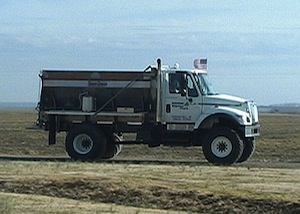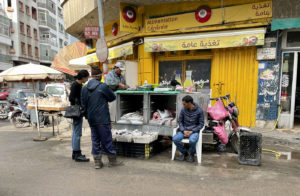Peak Fertilizer Ahead?
A major slab of the world’s supply of phosphorous -- one of the two dwindling, non-synthesizable elements used in industrial agriculture -- sits in highly disputed territory in Morocco, making future access to it uncertain.
A major slab of the world’s supply of phosphorous — one of the two dwindling, non-synthesizable elements used in industrial agriculture — sits in highly disputed territory in Morocco, making future access to it uncertain.
Tom Philpott at Mother Jones quotes a 2011 article published by environmental writer Fred Pearce in Yale Environment 360 that gives the historical context of the predicament:
“The Western Sahara is an occupied territory. In 1976, when Spanish colonialists left, its neighbor Morocco invaded, and has held it ever since. Most observers believe the vast phosphate deposits were the major reason that Morocco took an interest. Whatever the truth, the Polisario Front, a rebel movement the UN recognizes as the rightful representatives of the territory, would like it back.”
Another observer, widely trusted and acclaimed investor Jeremy Grantham, calls the Saharan phosphate cache “the most important quasi-monopoly in economic history.” That being the case, the Polisario Front is unlikely to let go of its claim without a fight.
As Pearce writes:
If the people of Western Sahara ever resume their war to get their country back—or if the Arab Spring spreads and Morocco goes the way of Libya—then we may be adding phosphate fertilizer to the list of finite resources, such as water and land, that are constraining world food supplies sooner than we think.”
— Posted by Alexander Reed Kelly.
Your support matters…Tom Philpott at Mother Jones:
Yet something tells me that peak phosphorus will continue to be an obscure topic. I’ve been writing about it since 2008 (see here, here, here, and here). Foreign Policy ran a major piece on it in 2010; 2011 brought Pearce’s article as well as a profile of Grantham in no less a forum than the New York Times Magazine, in which he talked up peak phosphorus at length. Even after all of that, I can think of few crucial issues as far from the center of public conversation than the phosphorus shortage. We’ve haven’t really begun to face the problem of climate change; our reliance on mined phosphorus doesn’t register at all. It’s easy to ignore crises whose most dire consequences loom decades away.
But the next time someone facilely insists that the “industrial farms are the future,” ask what the plan is regarding phosphorus. Developing an agriculture that’s ready for a phosphorus shortage means a massive focus on recycling the nutrients we take from the soil back into the soil—in other words, composting, not on a backyard level but rather on a society-wide scale. It also requires policies that give farmers incentives to build up organic matter in soil, so it holds in nutrients instead of letting them leach away (another massive problem stemming from our reliance on abundant NPK). Both of these solutions, of course, are specialties of organic agriculture.
Independent journalism is under threat and overshadowed by heavily funded mainstream media.
You can help level the playing field. Become a member.
Your tax-deductible contribution keeps us digging beneath the headlines to give you thought-provoking, investigative reporting and analysis that unearths what's really happening- without compromise.
Give today to support our courageous, independent journalists.





You need to be a supporter to comment.
There are currently no responses to this article.
Be the first to respond.